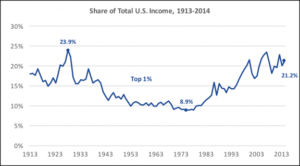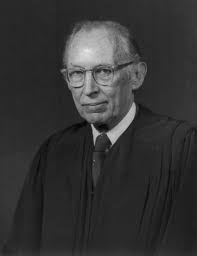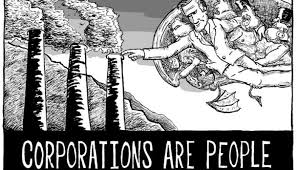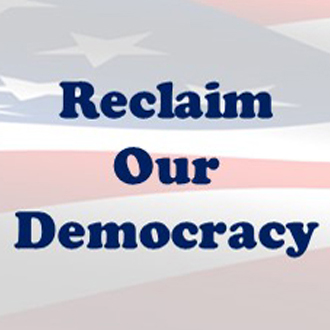It is hard to tell the story of how this happened in a few words. According to Emmanuel Saez, economic inequality hit a peak just before the depression in the 1920’s and then dropped and leveled off in the 1950’s, 60’s and 70’s. It started rising again just before Ronald Reagan became President in 1981 and has pretty much risen ever since. It is now back at the level it was just before the depression. The chart below shows the share of national income held by the top 1% of earners from 1913 to 2013.

 This turning point in the late 1970’s also coincides with some other notable events. In 1971, Lewis Powell, then a corporate lawyer and member of the boards of 11 corporations, wrote a memo to his friend Eugene Sydnor, Jr., the Director of the U.S. Chamber of Commerce. He asserted, in a memo that was to help galvanize business circles, that the “American economic system is under broad attack.” This attack, Powell maintained, required mobilization for political combat: “Business must learn the lesson . . . that political power is necessary; that such power must be assiduously cultivated; and that when necessary, it must be used aggressively and with determination—without embarrassment and without the reluctance which has been so characteristic of American business.” Moreover, Powell stressed, the critical ingredient for success would be organization: “Strength lies in organization, in careful long-range planning and implementation, in consistency of action over an indefinite period of years, in the scale of financing available only through joint effort, and in the political power available only through united action and national organizations.”
This turning point in the late 1970’s also coincides with some other notable events. In 1971, Lewis Powell, then a corporate lawyer and member of the boards of 11 corporations, wrote a memo to his friend Eugene Sydnor, Jr., the Director of the U.S. Chamber of Commerce. He asserted, in a memo that was to help galvanize business circles, that the “American economic system is under broad attack.” This attack, Powell maintained, required mobilization for political combat: “Business must learn the lesson . . . that political power is necessary; that such power must be assiduously cultivated; and that when necessary, it must be used aggressively and with determination—without embarrassment and without the reluctance which has been so characteristic of American business.” Moreover, Powell stressed, the critical ingredient for success would be organization: “Strength lies in organization, in careful long-range planning and implementation, in consistency of action over an indefinite period of years, in the scale of financing available only through joint effort, and in the political power available only through united action and national organizations.”
Shortly after this memo, business groups began to focus on increasing their political clout. They learned how to generate mass marketing and communication campaigns to flood Washington with letters and phone calls. They developed lists of prominent executives capable of making personal contacts with key legislative figures, and they massively increased political giving to both parties — at precisely the time when the cost of campaigns began to skyrocket (primarily due to television advertising).
 Meanwhile, in 1976, the Supreme Court (after Lewis Powell was appointed to the Court by Richard Nixon) ruled, in Buckley vs. Valeo, that spending money to influence elections is constitutionally protected under the First Amendment. In effect saying that money is speech. More recently:
Meanwhile, in 1976, the Supreme Court (after Lewis Powell was appointed to the Court by Richard Nixon) ruled, in Buckley vs. Valeo, that spending money to influence elections is constitutionally protected under the First Amendment. In effect saying that money is speech. More recently:
In 2010 Citizens United vs. Federal Elections Commission, the Supreme Court ruled that there would be no limit on the amount that corporations could spend on political advertising.
In 2013 McCutcheon vs. Federal Election Commission, the Supreme Court overturned limits for individuals on aggregate federal campaign donations, which meant that candidates could now more easily band together and raise big money from the same individuals through legal entities called “joint fundraising committees.” These committees let contributors write a single large check to an umbrella group (such as Obama for America), which, in turn, splits the money up among several beneficiaries.
How can we have these decisions overturned?
 In order to reverse these prior Supreme Court decisions we need to pass a 28th Amendment to the Constitution that makes it clear that artificial entities such as corporations do not have constitutional rights and that money is not the same as free speech. We can then pass laws that place limits on contributions and repair our election and legislative systems.
In order to reverse these prior Supreme Court decisions we need to pass a 28th Amendment to the Constitution that makes it clear that artificial entities such as corporations do not have constitutional rights and that money is not the same as free speech. We can then pass laws that place limits on contributions and repair our election and legislative systems.
If you would like to explore this chronology in more detail, there are a number of useful videos you can watch and articles you can read.
Videos:
- How corporations infiltrated the Supreme Court (7 min.) – from American Promise
- Our Democracy No Longer Represents the People (21 min.) – Larry Lessig
- Legalize Democracy (30 min.) – from Move to Amend
- The Dirty Secret of Capitalism and A New Way Forward (17 min) – Nick Hanauer
Articles:
If you are still not sure why this issue is important, please read the page Why Should I Care?
If you are ready to do something about this, please check out some possible actions on the page What Can I Do?
